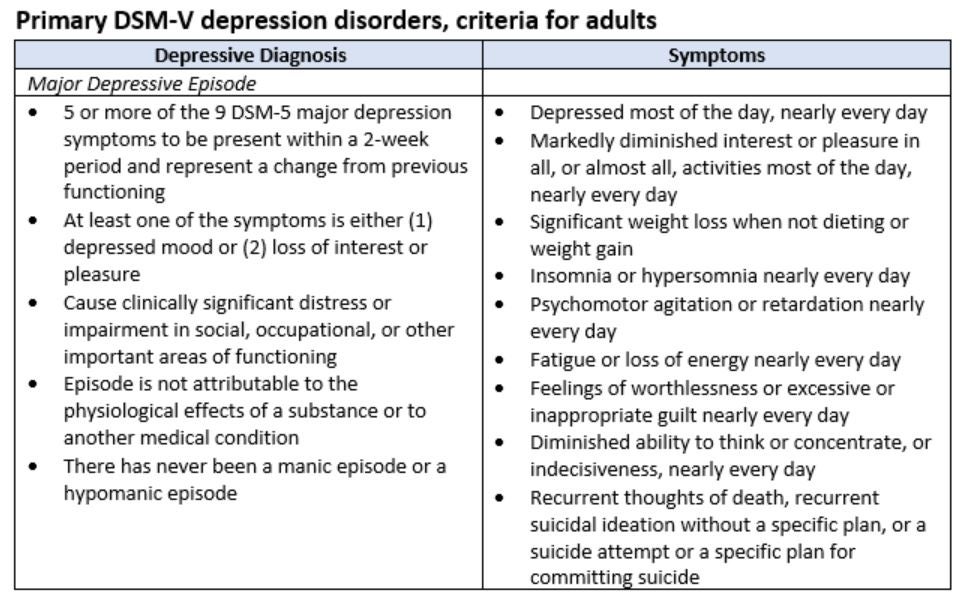

The occurrence of the episode is not better explained by a specified or unspecified schizophrenia spectrum disorder or other psychotic disorders.The depressive episode cannot be attributed to the physiological effects of a substance or other medical condition.The aforementioned symptoms cause clinically significant distress or impair everyday function.He or she has recurrent thoughts of death, suicidal ideation (without a specific plan), or a suicide attempt or specific plan for committing suicide.The individual’s ability to think, concentrate, or make decisions is diminished nearly every day.

The individual has feelings of worthlessness or excessive guilt nearly every day.He or she feels fatigued or tired nearly every day.Psychomotor hindrance nearly every day, which is observable by others and not just self-reported.He or she has insomnia or hypersomnia almost every day.The individual gains or loses a significant amount of weight, or experiences a decreased or increased appetite nearly every day.He or she has a significantly decreased interest in all or most activities for the majority of the day, nearly every day.The individual experiences a depressed state most of the day, virtually everyday, as recognized by thy self or others.Additionally, at least one of the symptoms is either a depressed mood or a loss of interest or pleasure. The following criteria, as determined by the DSM-5, must be met in order for a diagnosis of major depressive order to be made:Īt least five of the following symptoms must be present during the same 2-week period and represent a change from previous functioning. Diagnostic Criteria for Major Depressive Disorder DSM-5 Thoughts of suicide as well as suicide attempts are also common. Many individuals report an impaired ability to focus, to think, or even make the tiniest of decisions. In children and teens, the mood may not be depressed but irritable instead.

#DSM 5 MAJOR DEPRESSIVE DISORDER MANUAL#
The symptoms are not better accounted for by bereavement (i.e., after the loss of a loved one, the symptoms persist for longer than 2 months or are characterized by marked functional impairment, morbid preoccupation with worthlessness, suicidal ideation, psychotic symptoms, or psychomotor retardation).According to the Diagnostic and Statistical Manual of Mental Disorders, the essential feature of a major depressive episode is either depressed mood or loss of interest in daily activities over a period of at least two weeks. MDE is not better explained by schizophrenia spectrum or other psychotic disorders. There has never been a manic episode or hypomanic episode. The symptoms do not meet criteria for a mixed episode 3

The symptoms are not due to the direct physiological effects of a substance (e.g., drug abuse, a prescribed medication’s side effects) or a medical condition (e.g., hypothyroidism). The symptoms cause clinically significant distress or impairment in social, occupational, or other important areas of functioning. Five or more of the following A Criteria (at least one includes A1 or A2)Ī1 Depressed mood-indicated by subjective report or observation by others (in children and adolescents, can be irritable mood).Ī2 Loss of interest or pleasure in almost all activities-indicated by subjective report or observation by others.Ī3 Significant (more than 5 percent in a month) unintentional weight loss/gain or decrease/increase in appetite (in children, failure to make expected weight gains).Ī4 Sleep disturbance (insomnia or hypersomnia).Ī5 Psychomotor changes (agitation or retardation) severe enough to be observable by others.Ī6 Tiredness, fatigue, or low energy, or decreased efficiency with which routine tasks are completed.Ī7 A sense of worthlessness or excessive, inappropriate, or delusional guilt (not merely self-reproach or guilt about being sick).Ī8 Impaired ability to think, concentrate, or make decisions-indicated by subjective report or observation by others.Ī9 Recurrent thoughts of death (not just fear of dying), suicidal ideation, or suicide attempts.


 0 kommentar(er)
0 kommentar(er)
